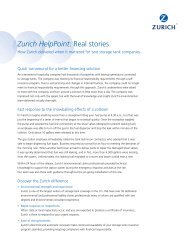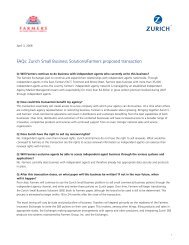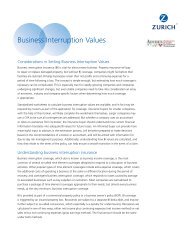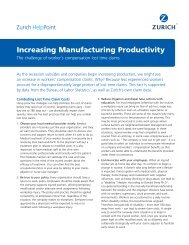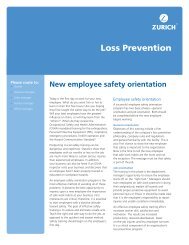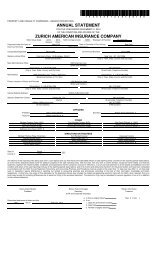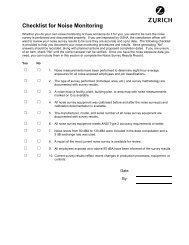Statutory and regulatory dutiesIn addition to <strong>the</strong> common law duties discussed above, federal and state statutesand regulations impose fur<strong>the</strong>r obligations and limitations upon directors andprovide means for supervising and enforcing those requirements. The following setsforth an overview of <strong>the</strong> most prevalent duties and requirements imposed upondirectors by those statutes and regulations:Qualifications and restrictions on board membershipUnlike o<strong>the</strong>r institutions, directors of national banks must meet certain eligibilityrequirements, including citizenship and residence. 19 Upon appointment orelection, a director of a national bank must take an oath that he or she will“diligently and honestly” administer <strong>the</strong> affairs of <strong>the</strong> bank and that he or shewill not “knowingly violate or willingly permit to be violated” any provision of<strong>the</strong> National Bank Act. 20 Independent of <strong>the</strong> common law duties of directors, thisoath requires a director of a national bank to take steps to ensure that <strong>the</strong> bankobserves applicable laws and regulations.Various provisions of federal law fur<strong>the</strong>r prohibit or restrict bank directors from servingas directors or officers of o<strong>the</strong>r types of institutions or o<strong>the</strong>rwise regulating suchrelationships. 21 For instance:• Except in certain limited circumstances, no director or officer of any member bankof <strong>the</strong> Federal Reserve System may be at <strong>the</strong> same time a director or officer of anyo<strong>the</strong>r bank organized under <strong>the</strong> National Bank Act or state law. 22• Federal law prohibits a director of any depository institution with assets exceeding$2.5 billion from serving as a director of any o<strong>the</strong>r nonaffiliated depositoryinstitution having assets exceeding $1.5 billion. 23• There are statutory restrictions on interlocks between depository institutions in <strong>the</strong>same geographical area. 24• Individuals who have been convicted of any criminal offense involving dishonestyor a breach of trust may serve as bank directors only with prior FDIC approval. 25In addition, many states impose o<strong>the</strong>r requirements for directors of statecharteredinstitutions.Heightened duties and liabilities for depository institutions19 12 U.S.C. § 72.20 Id.21 For example, 16 U.S.C. § 825(b) (publicutilities), 15 U.S.C. § 79q(c) (public utilityholding companies), and 15 U.S.C. § 80a-10(c)(investment companies).22 15 U.S.C. § 19.23 12 U.S.C. § 3203.24 12 U.S.C. § 3202, et seq.25 12 U.S.C. § 1829.A director of a depository institution may be personally liable under 12 U.S.C. §93 for violations by a bank or its officers, agents or employees of <strong>the</strong> provisionsof <strong>the</strong> National Bank Act, if <strong>the</strong> director participates in or permits such violations.This potential statutory liability is in addition to any civil liability for any breach by adirector of his common law duties. Even so, a bank director does not automaticallybecome an insurer against all losses suffered in connection with an unlawful actof <strong>the</strong> bank. In order for a bank director to be personally liable under 12 U.S.C. §93, <strong>the</strong> director must “knowingly violate, or knowingly permit any of <strong>the</strong> officers,9Financial institutions guide
agents, or servants of <strong>the</strong> [bank] to violate” <strong>the</strong> statute in question. Courts havesaid that a deliberate refusal to investigate that which <strong>the</strong> director has a dutyto investigate is tantamount to an intentional violation of <strong>the</strong> law, subjectinga director to personal liability for resulting losses. 26 Accordingly, bank directorsshould familiarize <strong>the</strong>mselves with <strong>the</strong> laws applicable to national banks in orderto recognize when <strong>the</strong>re may be a duty to investigate. Bank directors will not beexcused from this duty simply because <strong>the</strong>y lack an understanding of <strong>the</strong> pertinentstatutes and regulations.National banks are subject to limitations on <strong>the</strong> amount <strong>the</strong>y may lend to a singleborrower based on <strong>the</strong> bank’s capital and surplus and a national bank may not makea loan secured by its own stock. Bank directors who knowingly violate or knowinglypermit violations of any such limitations may be personally liable under <strong>the</strong> NationalBank Act. 27A wide array of o<strong>the</strong>r statutory and regulatory provisions govern <strong>the</strong> operation ofdepository institutions, including:• Depository institutions must maintain certain specified reserves and are subject torestrictions on paying dividends. 28• Depository institutions must make periodic reports as required by law. 29• Loans to “insiders” must be made on substantially <strong>the</strong> same terms, includinginterest rates and collateral, as those prevailing at <strong>the</strong> time for comparabletransactions with o<strong>the</strong>r persons and must not involve more than <strong>the</strong> normal risk ofrepayment or present o<strong>the</strong>r unfavorable features. 30• Depository institutions may not engage in impermissible “tying” arrangements. 31Directors who violate or participate in violations of those statutes and regulationscould be liable to <strong>the</strong> same extent as <strong>the</strong> financial institution.Regulatory Examinations26 Corsicana National Bank v. Johnson, supra at71-72; Michelsen v. Penney, 135 F.2d 409, 420(2d Cir. 1943).27 See, e.g., del Junco v. Conover, 682 F.2d 1338,1341-42 (9th Cir. 1982), cert. denied 103 S.Ct.786 (1983).28 12 U.S.C. § 60.29 12 U.S.C. § 161. See, e.g., Chesbrough v.Woodworth, 244 U.S. 72, 76 (1917); Harmsenv. Smith, 542 F.2d 496, 500 (9th Cir., 1976).30 12 U.S.C. § 375b(2)(a).31 12 U.S.C. §§ 1971, et seq. “Tying” isconditioning credit or <strong>the</strong> availability ofo<strong>the</strong>r services upon a customer’s agreementto engage in additional credit or servicetransactions with <strong>the</strong> bank or its affiliates.An examination report may be <strong>the</strong> most important vehicle for <strong>the</strong> ongoing regulatorysupervision and enforcement of <strong>the</strong> duties of depository institutions and <strong>the</strong>irdirectors. In making periodic examinations, <strong>the</strong> regulator will assess <strong>the</strong> quality of <strong>the</strong>institution’s assets, match assets with liabilities to evaluate liquidity and earnings, andreview management practices and capabilities. The report will specify any concerns<strong>the</strong> regulator may have with respect to <strong>the</strong> institution’s operations and may makerecommendations or suggest goals for <strong>the</strong> institution to pursue. Directors shouldreview carefully all examination reports to inform <strong>the</strong>mselves of <strong>the</strong> examiner’sanalysis of <strong>the</strong> institution’s operations and to ensure that management is acting tocorrect any identified problems.FIRREAIn 1989, Congress enacted <strong>the</strong> Financial Institutions Reform, Recovery andEnforcement Act of 1989 (FIRREA) in response to <strong>the</strong> rise in failures of depositoryinstitutions. FIRREA enhanced <strong>the</strong> enforcement powers of <strong>the</strong> Federal Deposit10Financial institutions guide



